Discover The Health Advocates
The Health Advocates

The Health Advocates
Author: Global Healthy Living Foundation
Subscribed: 5Played: 470Subscribe
Share
© 2026 GHLF 2021
Description
A podcast that breaks down major health news of the week to help you make sense of it all. Our goal is to help you understand what’s happening in the healthcare world to help you make informed decisions to live your best life.
188 Episodes
Reverse
In this episode of The Health Advocates, Steven Newmark breaks down a surprising moment of bipartisan agreement in Congress: a new Health and Human Services funding bill that includes meaningful wins for patients and public health. From protecting CDC and NIH funding to extending telehealth flexibilities and hospital-at-home programs, the bill also takes historic steps to reform Pharmacy Benefit Managers (PBMs), aiming to make drug pricing more transparent and patient-centered. Steven walks through what’s in the legislation, what was left out, and why PBM reform could have a direct impact on out-of-pocket costs and medication access. Plus, what this deal signals about the power of patient advocacy in shaping policy—even in a divided political climate. Contact Our HostSteven Newmark, Chief of Policy at GHLF: snewmark@ghlf.orgA podcast episode produced by Ben Blanc, Director, Digital Production and Engagement at GHLF.We want to hear what you think. Send your comments in the form of an email, video, or audio clip of yourself to podcasts@ghlf.orgListen to all episodes of The Health Advocates on our website or on your favorite podcast channel.See omnystudio.com/listener for privacy information.
In this episode of The Health Advocates, Steven Newmark speaks with Ohio State Representative Michele Grim, the only public health professional currently serving in the Ohio legislature. Rep. Grim shares how her background in public health advocacy led her to politics, where she now champions legislation to expand access to care, fight misinformation, and protect vulnerable populations. Together, they dive into the challenges of health policy in today’s polarized environment, and the importance of having voices at the table who understand the system from the inside out.Contact Our HostSteven Newmark, Chief of Policy at GHLF: snewmark@ghlf.orgA podcast episode produced by Ben Blanc, Director, Digital Production and Engagement at GHLF.We want to hear what you think. Send your comments in the form of an email, video, or audio clip of yourself to podcasts@ghlf.orgListen to all episodes of The Health Advocates on our website or on your favorite podcast channel.See omnystudio.com/listener for privacy information.
In this episode of The Health Advocates, we break down one of the most pivotal and controversial ACIP meetings in recent history. The CDC’s vaccine advisory committee voted to roll back the universal hepatitis B birth dose, a policy that has protected newborns from chronic liver disease for more than three decades. We explain what ACIP decided, why the changes were not based on new scientific evidence, and how misinformation and ideological viewpoints shaped the discussion.We also explore the real-world consequences for families, clinicians, and health systems. From confusing new recommendations to unnecessary blood tests to disruptions in the overall childhood immunization schedule, these changes will make it harder for parents to access safe, routine preventive care. But the meeting also revealed something hopeful: strong advocacy — from medical societies, public health experts, grassroots organizers, and patient groups — helped prevent even more extreme proposals from becoming policy.Finally, we discuss what comes next as ACIP reviews additional childhood vaccines and how advocates, clinicians, and community members can stay engaged to protect science-based immunization policy.Contact Our HostSteven Newmark, Chief of Policy at GHLF: snewmark@ghlf.orgA podcast episode produced by Ben Blanc, Director, Digital Production and Engagement at GHLF.We want to hear what you think. Send your comments in the form of an email, video, or audio clip of yourself to podcasts@ghlf.orgListen to all episodes of The Health Advocates on our website or on your favorite podcast channel.See omnystudio.com/listener for privacy information.
In this special year-end episode of The Health Advocates, host Steven Newmark takes a step back to review several of the most significant public health developments of 2025.The episode covers major leadership changes at the U.S. Department of Health and Human Services, key meetings and votes of the Advisory Committee on Immunization Practices (ACIP), ongoing challenges related to vaccine access and uptake, and continued debates over prescription drug pricing, including “Trump Rx.” Steven also examines the rapid expansion of GLP-1 medications, the implementation of Inflation Reduction Act health provisions, public health workforce pressures, infectious disease monitoring beyond COVID-19, maternal health initiatives, and the evolving role of data and communication in public health.Rather than an opinion piece, this episode offers a straightforward recap of how policy decisions, advisory processes, and healthcare system dynamics shaped public health in 2025 and set the stage for the year ahead.Contact Our Host Steven Newmark, Chief of Policy at GHLF: snewmark@ghlf.orgA podcast episode produced by Ben Blanc, Director, Digital Production and Engagement at GHLF.We want to hear what you think. Send your comments in the form of an email, video, or audio clip of yourself to podcasts@ghlf.orgListen to all episodes of The Health Advocates on our website or on your favorite podcast channel.See omnystudio.com/listener for privacy information.
In this episode of The Health Advocates, we break down one of the most pivotal and controversial ACIP meetings in recent history. The CDC’s vaccine advisory committee voted to roll back the universal hepatitis B birth dose — a policy that has protected newborns from chronic liver disease for more than three decades. We explain what ACIP decided, why the changes were not based on new scientific evidence, and how misinformation and ideological viewpoints shaped the discussion.We also explore the real-world consequences for families, clinicians, and health systems. From confusing new recommendations to unnecessary blood tests to disruptions in the overall childhood immunization schedule, these changes will make it harder for parents to access safe, routine preventive care. But the meeting also revealed something hopeful: strong advocacy — from medical societies, public health experts, grassroots organizers, and patient groups — helped prevent even more extreme proposals from becoming policy.Finally, we discuss what comes next as ACIP reviews additional childhood vaccines and how advocates, clinicians, and community members can stay engaged to protect science-based immunization policy.Contact Our Host Steven Newmark, Chief of Policy at GHLF: snewmark@ghlf.orgA podcast episode produced by Ben Blanc, Director, Digital Production and Engagement at GHLF.We want to hear what you think. Send your comments in the form of an email, video, or audio clip of yourself to podcasts@ghlf.orgListen to all episodes of The Health Advocates on our website or on your favorite podcast channel.See omnystudio.com/listener for privacy information.
How can lawmakers rebuild public trust in health, and make prevention a shared priority?In this episode of The Health Advocates, Steven Newmark speaks with Texas State Representative Nicole Collier, a leading voice on health equity, women’s health, and preventive care. From her work on the Select Committee on Preventable Diseases and Women’s Health to her advocacy for fair access to vaccines, Rep. Collier brings a clear message: prevention isn’t political, it’s essential.Together, Steven and Rep. Collier explore:- How preventive care, including vaccines, strengthens community trust- Why health equity starts with access to reliable information and local leadership- How Texas can serve as a model for bipartisan public-health collaborationTo learn more about vaccine recommendations and find reliable resources for patients, visit: ghlf.org/vaccines Contact Our Host Steven Newmark, Chief of Policy at GHLF: snewmark@ghlf.orgA podcast episode produced by Ben Blanc, Director, Digital Production and Engagement at GHLF.We want to hear what you think. Send your comments in the form of an email, video, or audio clip of yourself to podcasts@ghlf.orgListen to all episodes of The Health Advocates on our website or on your favorite podcast channel.See omnystudio.com/listener for privacy information.
In this special Thanksgiving episode, Steven helps our community prepare for the conversations that matter most. Every year, GHLF shares its “Turkey Day Talking Points” to support people living with chronic illness or who are immunocompromised as they navigate discussions about vaccines with family and friends.This episode breaks down simple, compassionate ways to explain why vaccines are so important, and why protection for immunocompromised people relies not only on their own shots, but also on the vaccination decisions of those around them. Steven emphasizes that for many patients, vaccines aren’t political; they’re personal. They’re about staying healthy enough to participate in holidays, gatherings and everyday life.Whether you're looking for language to make yourself heard without sparking conflict, or you want to help loved ones understand what vaccine protection really means for you, this episode offers guidance rooted in empathy, clarity and lived experience. To learn more about vaccine recommendations and find reliable resources for patients, visit: ghlf.org/vaccinesContact Our HostSteven Newmark, Chief of Policy at GHLF: snewmark@ghlf.orgA podcast episode produced by Ben Blanc, Director, Digital Production and Engagement at GHLF.We want to hear what you think. Send your comments in the form of an email, video, or audio clip of yourself to podcasts@ghlf.orgListen to all episodes of The Health Advocates on our website or on your favorite podcast channel.See omnystudio.com/listener for privacy information.
In this episode of The Health Advocates, host Steven Newmark breaks down what the recent federal government shutdown means for health care access and vulnerable patients. Then, he’s joined by Mahsa Pazokifard, a passionate patient advocate living with IgG4-related disease (IgG4-RD), a rare and often misunderstood autoimmune condition. Mahsa opens up about the challenges of getting diagnosed, how the disease has impacted her life and career, and why raising awareness is essential. Whether you’ve never heard of IgG4-RD or are living with a chronic illness yourself, this episode offers powerful insights into patient advocacy, rare disease awareness, and the human side of health care policy. To learn more about IgG4-Related Disease, visit: creakyjoints.org/igg4-rd-guide To learn more about vaccine recommendations and find reliable resources for patients, visit: ghlf.org/vaccines Contact Our Host Steven Newmark, Chief of Policy at GHLF: snewmark@ghlf.org A podcast episode produced by Ben Blanc, Director, Digital Production and Engagement at GHLF. We want to hear what you think. Send your comments in the form of an email, video, or audio clip of yourself to podcasts@ghlf.org Listen to all episodes of The Health Advocates on our website or on your favorite podcast channel.See omnystudio.com/listener for privacy information.
Pandemics aren’t only about pathogens, they’re about people, politics, and the deep inequities in our health systems. In this episode of The Health Advocates, Steven Newmark speaks with Dr. Tyler Evans, an infectious disease and public health leader whose career has spanned the front lines of global outbreaks from Ebola to COVID-19. As the former Chief Medical Officer for New York City and co-founder of the Wellness and Equity Alliance, Dr. Evans brings firsthand insight into how societal structures can shape, and sometimes worsen, the course of a public health crisis. The conversation dives into key themes from Dr. Evans’ new book, Pandemics, Poverty, and Politics (Johns Hopkins Press, August 2025), which examines how inequality, poverty, and fractured health systems accelerate the spread of disease. Dr. Evans explains why scientific breakthroughs alone aren’t enough, we must also tackle the injustices that leave vulnerable communities at greatest risk. From vaccine mandates to climate change’s role in infectious disease, from disinformation to the erosion of public trust, this episode offers both a sobering reality check and a call to action. Whether you’re a healthcare professional, policymaker, or concerned citizen, you’ll come away with a deeper understanding of why true pandemic preparedness starts with equity.To learn more about Dr. Tyler Evans’ book, Pandemics, Poverty, and Politics, click here. Contact Our Host Steven Newmark, Chief of Policy at GHLF: snewmark@ghlf.org A podcast episode produced by Ben Blanc, Director, Digital Production and Engagement at GHLF. We want to hear what you think. Send your comments in the form of an email, video, or audio clip of yourself to podcasts@ghlf.org Listen to all episodes of The Health Advocates on our website or on your favorite podcast channel.See omnystudio.com/listener for privacy information.
Open enrollment for 2026 is underway — and for millions of Americans managing chronic or rare diseases, understanding your health insurance options is essential. In this episode of The Health Advocates, Steven Newmark breaks down what open enrollment is, what’s new this year, and how to navigate changes in your plan. Drawing from Aimed Alliance’s 2026 Open Enrollment guide, Steven explains key terms like deductibles and out-of-pocket limits, explores what to watch for in your plan’s formulary, and outlines the impact of potential changes to ACA subsidies. Whether you’re reviewing employer coverage or shopping through HealthCare.gov, this episode will help you make informed, patient-centered choices for the year ahead. Listen and learn: What to look for in your 2026 plan How to protect your access to medications and providers Why ACA subsidies and transparency rules matter for affordability Contact Our Host Steven Newmark, Chief of Policy at GHLF: snewmark@ghlf.org A podcast episode produced by Ben Blanc, Director, Digital Production and Engagement at GHLF. We want to hear what you think. Send your comments in the form of an email, video, or audio clip of yourself to podcasts@ghlf.org Listen to all episodes of The Health Advocates on our website or on your favorite podcast channel.See omnystudio.com/listener for privacy information.
In this special episode of The Health Advocates, Steven Newmark speaks with Kathi Lopez, who shares her journey of being diagnosed with Giant Cell Arteritis (GCA). Kathi talks about the challenges of getting a proper diagnosis, navigating treatment, and managing life with a rare autoimmune condition. She shares how staying informed, connected, and engaged in advocacy has helped her take control of her care, and how she now helps others do the same. Her story sheds light on the realities of living with GCA and the importance of raising awareness for rare conditions. Tune in to hear Kathi’s inspiring story and help us raise awareness for GCA. To learn more about Giant Cell Arteritis, visit https://ghlf.org/gca Contact Our Host Steven Newmark, Chief of Policy at GHLF: snewmark@ghlf.org A podcast episode produced by Ben Blanc, Director, Digital Production and Engagement at GHLF. We want to hear what you think. Send your comments in the form of an email, video, or audio clip of yourself to podcasts@ghlf.org Listen to all episodes of The Health Advocates on our website or on your favorite podcast channel.See omnystudio.com/listener for privacy information.
The 2025 Nobel Prize in Physiology or Medicine recognized groundbreaking advances in understanding immune regulation — but what do they mean for people living with autoimmune disease? In this episode, Dr. Shilpa Venkatachalam, Chief Patient-Centered Research and Ethical Oversight Officer at GHLF, joins Steven to explore how our immune system knows when to act — and when to stop. Shilpa explains the importance of these discoveries, why immune “brakes” matter in autoimmune conditions like lupus or rheumatoid arthritis, and how research breakthroughs can lead to better treatments. She also shares why patients are key partners in turning lab science into real-world therapies. Tune in to learn how Nobel-winning science could help unlock better care for autoimmune disease. To read the full article — “How a Nobel Prize Discovery Gives New Hope for Calming the Immune System in Autoimmune Diseases” — visit: https://creakyjoints.org/research/research-immune-nobel-prize-autoimmune/Contact Our Host Steven Newmark, Chief of Policy at GHLF: snewmark@ghlf.org A podcast episode produced by Ben Blanc, Director, Digital Production and Engagement at GHLF. We want to hear what you think. Send your comments in the form of an email, video, or audio clip of yourself to podcasts@ghlf.org Listen to all episodes of The Health Advocates on our website (https://ghlf.org/the-health-advocates) or on your favorite podcast channel.See omnystudio.com/listener for privacy information.
What happens to America’s health when Washington grinds to a halt? In this episode of The Health Advocates, we break down the latest federal government shutdown and what it means for public health agencies across the country. We explain what a shutdown actually is, drawing from past shutdowns over the last 30 years, and then dive into the immediate and long-term impacts on the CDC, FDA, NIH, and other agencies that millions of people depend on for research, vaccines, food safety, and emergency response. We also look at the political stalemate behind the shutdown, focusing on Democrats’ push to restore pending cuts to Affordable Care Act subsidies and what those cuts could mean for healthcare costs. Finally, we explore whether there’s a realistic path to resolution soon—and what’s at stake for patients and the healthcare system if Congress fails to act. Contact Our Host Steven Newmark, Chief of Policy at GHLF: snewmark@ghlf.org A podcast episode produced by Ben Blanc, Director, Digital Production and Engagement at GHLF. We want to hear what you think. Send your comments in the form of an email, video, or audio clip of yourself to podcasts@ghlf.org Listen to all episodes of The Health Advocates on our website (https://ghlf.org/the-health-advocates) or on your favorite podcast channel.See omnystudio.com/listener for privacy information.
In this episode of The Health Advocates, Steven Newmark sits down with Richard (RJ) Kedziora, co-founder of Estenda Solutions, to explore the intersection of technology, data, and patient advocacy. With decades of experience in healthcare technology, RJ shares how he and his team design digital tools that help patients take control of their health while supporting providers and payers alike. They also discuss patient engagement, accessibility, and the future of artificial intelligence in healthcare. Whether you're a tech enthusiast, a healthcare professional, or a patient advocate, this conversation offers insights on building smarter, more empathetic digital health solutions. Contact Our Host Steven Newmark, Chief of Policy at GHLF: snewmark@ghlf.org A podcast episode produced by Ben Blanc, Director, Digital Production and Engagement at GHLF. We want to hear what you think. Send your comments in the form of an email, video, or audio clip of yourself to podcasts@ghlf.org Listen to all episodes of The Health Advocates on our website (https://ghlf.org/the-health-advocates) or on your favorite podcast channel.See omnystudio.com/listener for privacy information.
In this episode of The Health Advocates, we unpack a turbulent week in public health. The CDC’s Vaccine Advisory Committee (ACIP), now reshaped under Health Secretary Robert F. Kennedy Jr., met to debate changes to the COVID-19, MMRV, and Hepatitis B vaccine recommendations. Despite heated rhetoric and process irregularities, the committee ultimately kept broad access to COVID-19 vaccines — a short-term win for patients and a reminder that advocacy pressure works.We also break down President Trump’s recent claims linking Tylenol use during pregnancy to autism, and his renewed suggestion of a connection between vaccines and autism. We review what the science actually shows, what public health experts are warning about, and what patients and families should know moving forward.Tune in for clarity on a confusing week — and why these debates matter for access, trust, and the future of public health. Contact Our Host Steven Newmark, Chief of Policy at GHLF: snewmark@ghlf.org A podcast episode produced by Ben Blanc, Director, Digital Production and Engagement at GHLF. We want to hear what you think. Send your comments in the form of an email, video, or audio clip of yourself to podcasts@ghlf.org Listen to all episodes of The Health Advocates on our website (https://ghlf.org/the-health-advocates) or on your favorite podcast channel.See omnystudio.com/listener for privacy information.
This fall’s Covid-19 vaccine rollout is more confusing than ever. The FDA has narrowed eligibility to older adults and people with high-risk conditions, while major medical societies are urging broader access — and insurance companies are waiting for new guidance from ACIP, the advisory committee that’s been reshaped by RFK Jr. In this episode of The Health Advocates, host Steven Newmark explains who qualifies as high-risk, what “off-label” vaccination means, how coverage is likely to work, and what parents, pregnant people, and adults should know heading into the fall season. Contact Our Host Steven Newmark, Chief of Policy at GHLF: snewmark@ghlf.org A podcast episode produced by Ben Blanc, Director, Digital Production and Engagement at GHLF. We want to hear what you think. Send your comments in the form of an email, video, or audio clip of yourself to podcasts@ghlf.org Listen to all episodes of The Health Advocates on our website (https://ghlf.org/the-health-advocates) or on your favorite podcast channel.See omnystudio.com/listener for privacy information.
In this special episode of The Health Advocates, we take a closer look at Polymyalgia Rheumatica (PMR), a condition that affects tens of thousands of older adults each year in the U.S. but is often misunderstood. Host Steven Newmark is joined by GHLF’s Angela Degrassi, patient advocate Eileen Salsman, and two leading experts — Dr. Leonard Calabrese and Dr. Jeffrey Curtis — to unpack what PMR is, how it impacts daily life, and why a patient-centered approach to research and care is so important. Together, they explore symptoms, diagnosis, steroid treatment challenges, and emerging insights from new research and lived experience. Special note: We invite you to a live webinar on Polymyalgia Rheumatica (PMR) that will explore critical gaps in diagnosis and disease monitoring. Date: Thursday, September 18thTime: 6:30 PM EasternLocation: Live on YouTube To register, visit: https://www.research.net/r/RKW2FHZ Contact Our Host Steven Newmark, Chief of Policy at GHLF: snewmark@ghlf.org A podcast episode produced by Ben Blanc, Director, Digital Production and Engagement at GHLF. We want to hear what you think. Send your comments in the form of an email, video, or audio clip of yourself to podcasts@ghlf.org Listen to all episodes of The Health Advocates on our website (https://ghlf.org/the-health-advocates) or on your favorite podcast channel.See omnystudio.com/listener for privacy information.
CDC Director Susan Monarez has been fired after less than one month on the job, sparking a wave of resignations by senior leaders and raising alarms about the politicization of public health. In this episode of The Health Advocates, host Steven Newmark unpacks what happened, why it matters, and what the loss of experienced leadership means for patients and communities. From vaccines to emergency preparedness, the future of the CDC — and public trust in science — is on the line. Contact Our Host Steven Newmark, Chief of Policy at GHLF: snewmark@ghlf.org A podcast episode produced by Ben Blanc, Director, Digital Production and Engagement at GHLF. We want to hear what you think. Send your comments in the form of an email, video, or audio clip of yourself to podcasts@ghlf.org Listen to all episodes of The Health Advocates on our website (https://ghlf.org/the-health-advocates) or on your favorite podcast channel.See omnystudio.com/listener for privacy information.
A leaked draft of the Trump administration’s Make Our Children Healthy Again plan reveals a strategy to improve kids’ health that’s far less sweeping than many expected. Instead of bold action on processed foods and pesticides, the draft emphasizes “awareness” campaigns and industry-friendly guidelines, while reopening old battles over vaccines, fluoride, and even WiFi.In this episode of The Health Advocates, Steven unpacks what’s actually in the leaked report, what’s missing, and why these proposals could reshape public health for children across the country. From school nutrition to pesticide regulation to vaccine safety, we break down what the draft means for families, industry, and the future of U.S. health policy. Contact Our Host Steven Newmark, Chief of Policy at GHLF: snewmark@ghlf.org A podcast episode produced by Ben Blanc, Director, Digital Production and Engagement at GHLF. We want to hear what you think. Send your comments in the form of an email, video, or audio clip of yourself to podcasts@ghlf.org Listen to all episodes of The Health Advocates on our website (https://ghlf.org/the-health-advocates) or on your favorite podcast channel.See omnystudio.com/listener for privacy information.
In this episode, Steven is joined by Dr. Zameer Pirani, an interventional pain specialist and co-founder of the Afiya Spine and Pain Institute in Canada. Dr. Pirani shares his path to pain medicine, from early training in Ireland to his experiences with anesthesia and chronic pain fellowships. He discusses how the opioid crisis, gaps in the health care system, and the stigma surrounding pain patients shaped his career and passion for multidisciplinary, patient-centered care. Dr. Pirani also shares his insights on the challenges of treating invisible illnesses, building trust with patients, and why true healing requires listening, empathy, and a team-based approach.Contact Our Host Steven Newmark, Chief of Policy at GHLF: snewmark@ghlf.org A podcast episode produced by Ben Blanc, Director, Digital Production and Engagement at GHLF. We want to hear what you think. Send your comments in the form of an email, video, or audio clip of yourself to podcasts@ghlf.org Listen to all episodes of The Health Advocates on our website (https://ghlf.org/the-health-advocates) or on your favorite podcast channel.See omnystudio.com/listener for privacy information.








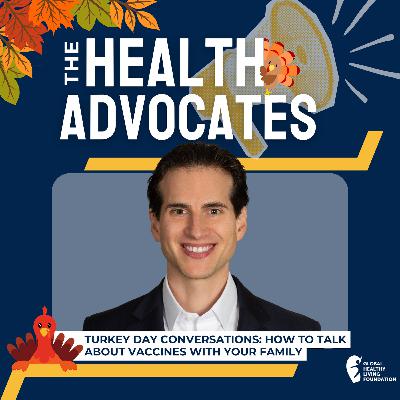
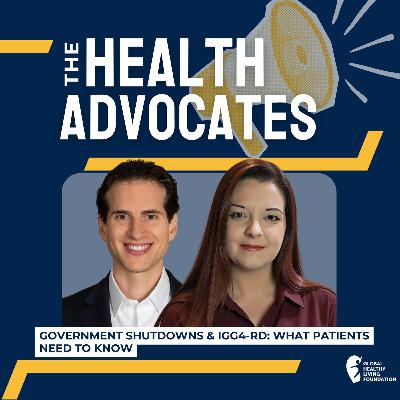
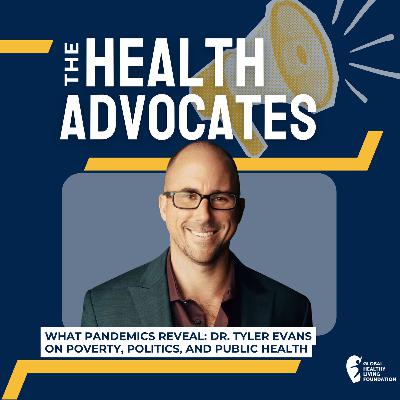
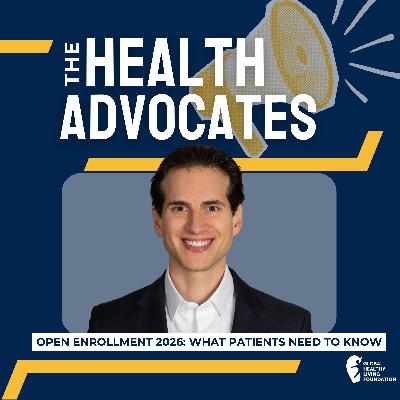
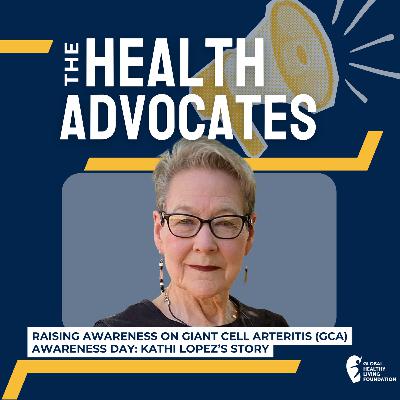
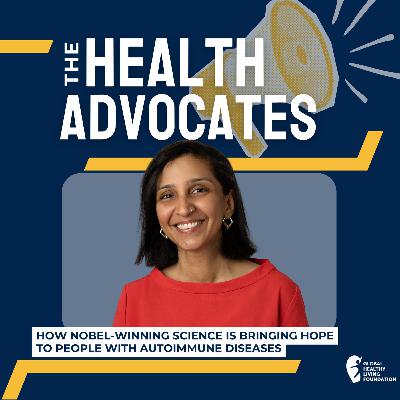
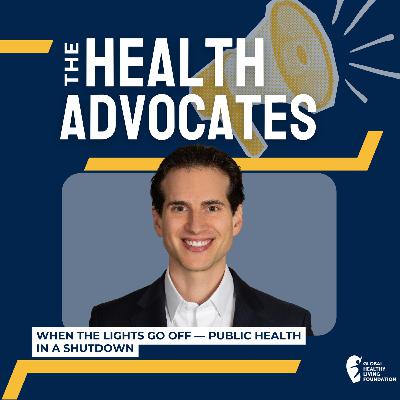
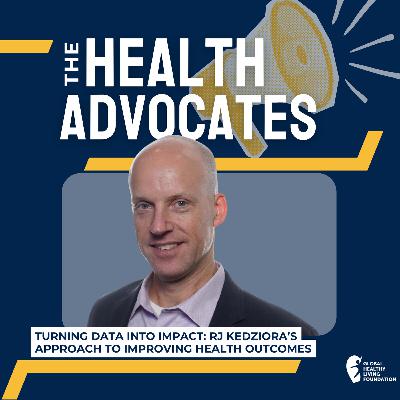
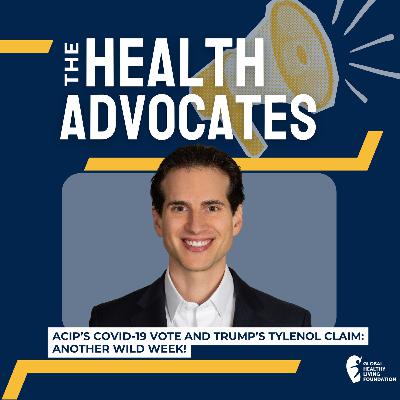
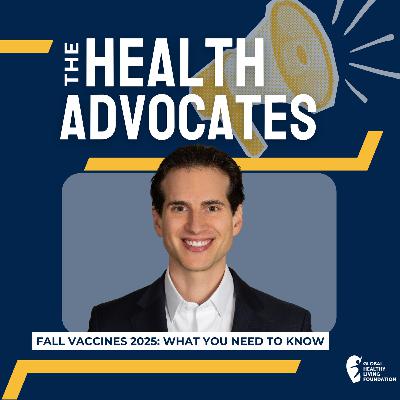
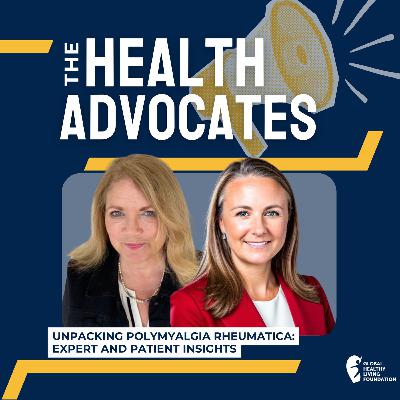
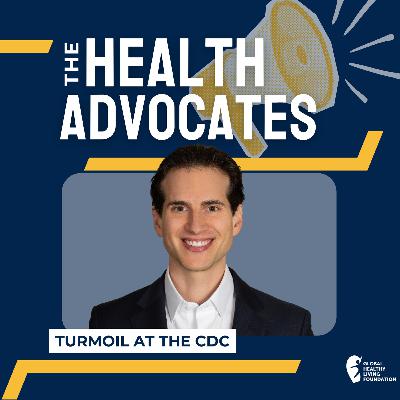
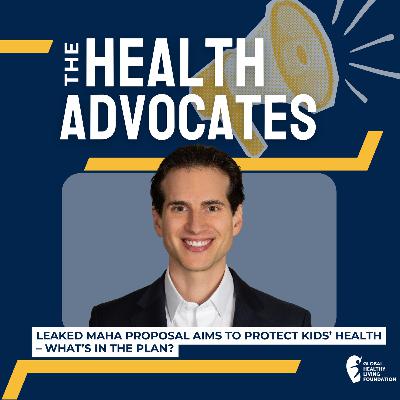
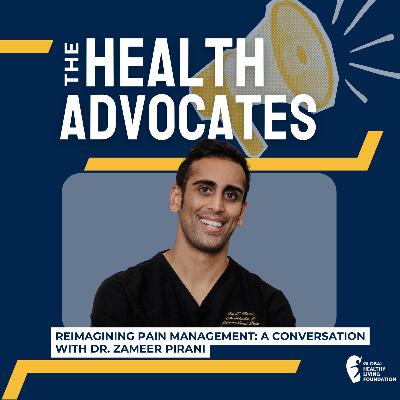



lol look around during open enrollment ... then the insurance co will change what's covered mid year anyway